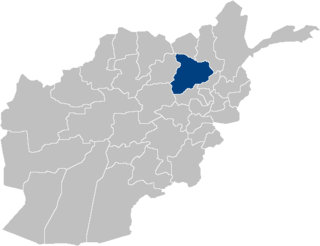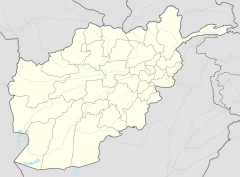
Ahmed Wali Karzai was an Afghan politician who served as Chairman of the Kandahar Provincial Council from 2005 until his death. He was the younger paternal half-brother of former Afghan President Hamid Karzai and an elder of the Popalzai tribe. Wali Karzai formerly lived in the United States, where he managed a restaurant owned by his family. He returned to Afghanistan following the removal of the Taliban government in late 2001. He has been accused of political corruption and was allegedly on the CIA payroll. He was assassinated by one of his close bodyguards, Sardar Mohammad, on 12 July 2011.

The Taliban insurgency began after the group's fall from power during the 2001 War in Afghanistan. The Taliban forces fought against the Afghan government, led by President Hamid Karzai, and later by President Ashraf Ghani, and against a US-led coalition of forces that has included all members of NATO; the 2021 Taliban offensive resulted in the collapse of the government of Ashraf Ghani. The private sector in Pakistan extends financial aid to the Taliban, contributing to their financial sustenance.
During the War in Afghanistan, according to the Costs of War Project the war killed 176,000 people in Afghanistan: 46,319 civilians, 69,095 military and police and at least 52,893 opposition fighters. However, the death toll is possibly higher due to unaccounted deaths by "disease, loss of access to food, water, infrastructure, and/or other indirect consequences of the war." According to the Uppsala Conflict Data Program, the conflict killed 212,191 people. The Cost of War project estimated in 2015 that the number who have died through indirect causes related to the war may be as high as 360,000 additional people based on a ratio of indirect to direct deaths in contemporary conflicts.
The following lists events that happened during 2004 in Afghanistan.
Events from the year 2007 in Afghanistan.

The 2007 Baghlan sugar factory bombing occurred on November 6, 2007, when a bomb exploded in the centre of Baghlan, Afghanistan, while a delegation of parliamentarians was visiting, killing at least 72 people including several lawmakers.
The Sarposa Prison attack was a raid on the Sarposa Prison in Kandahar, Afghanistan by Taliban insurgents on June 13, 2008. One of the largest attacks by Afghan insurgents, the raid freed 400-1000 prisoners. As of 2008, prison administration was overseen by Abdul Qabir.

The 2008 Indian embassy bombing in Kabul was a suicide bomb terror attack on the Indian embassy in Kabul, Afghanistan on 7 July 2008 at 8:30 AM local time. The bombing killed 58 people and wounded 141. The suicide car bombing took place near the gates of the embassy during morning hours when officials enter the embassy.
The February 2010 Kabul attack on 26 February 2010 was a combined suicide bombing and shooting attack. A car bomb levelled the Arya Guesthouse, also known as the Hamid Guesthouse, popular with Indian doctors. Two armed attackers then entered the nearby Park Residence, housing other foreigners. One detonated a suicide bomb, and the other was shot dead. The Safi Landmark Hotel nearby was badly damaged by the blasts. At least 18 people were killed and 36 more were injured.
The May 2010 Kabul bombing occurred on May 18, 2010, in Kabul, Afghanistan. 18 people, including 5 US soldiers and a Canadian soldier, were killed and 52 were injured when a NATO convoy was targeted by a Taliban suicide attacker. It was the deadliest attack against NATO forces in Afghanistan since September 2009, when six Italian soldiers were killed by a suicide bomber. Two full colonels and two lieutenant colonels were killed in this attack, making it the deadliest attack against ranking officers in Afghanistan. With this attack, the total number of Americans killed in Afghanistan crossed one thousand.
Events from the year 2010 in Afghanistan.
Events from the year 2011 in Afghanistan.
2003 in Afghanistan. A list of notable incidents in Afghanistan during 2003

The 2011 Afghanistan Ashura bombings were a pair of bombings in the Afghan capital of Kabul and Mazar-e-Sharif. The Kabul suicide bombing took place at around noon local time, on the day when Muslims commemorate Ashura, an annual holy day throughout the Muslim world particularly by the Shi'a Muslims.

Events from the year 2012 in Afghanistan.
The following lists events that happened in 2013 in Afghanistan.
The following lists events that happened during 2015 in Afghanistan.
On 10 January 2017, multiple bombings in Afghanistan occurred at government and tribal establishments during the renewed War in Afghanistan. The Taliban claimed responsibility for all but one of the attacks, which targeted a United Arab Emirates diplomatic mission. In total, at least 64 to at least 88 people were killed and at least 94 were wounded, with at least three attackers also being killed. Other attacks may have taken place.
Events from the year 2019 in Afghanistan.






